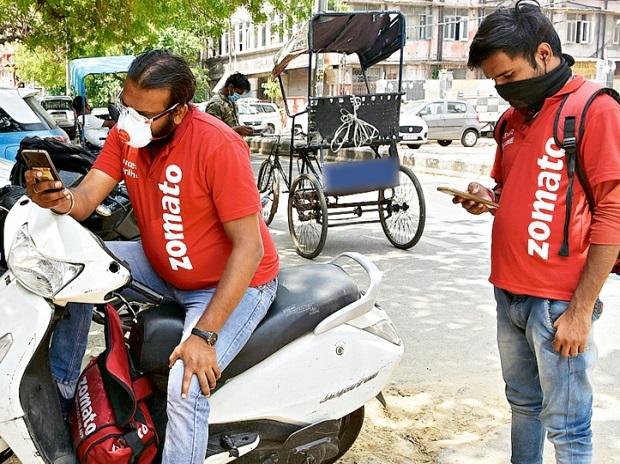Food delivery giant Zomato reported its revenues for the financial year 2019-20 at Rs 2,743 crore on a consolidated basis, up about 100 per cent since the last financial year. The Gurugram-based unicorn also reported a consolidated net loss of Rs 2,386 crore during the same fiscal, up 138 per cent from the previous financial year, showed regulatory documents sourced from business intelligence platform Tofler. The Deepinder Goyal-led firm’s total expenses for the fiscal were reported as Rs 5006 crore.
During the financial year, Zomato had bought certain specified assets and received the benefits of certain covenants amounting to around Rs 1,376 crore from Uber India Systems Pvt Ltd against issuance of 76,376 compulsorily convertible cumulative preference shares.
During the year under review, the firm's authorised share capital rose from about Rs 272 crore to over Rs 422 crore. During the financial year, the firm has raised Rs 353 crore from Antfin Singapore Holdings Pte. Ltd and Rs 38 crore from Pacific Horizon Investment Trust PLC.
In January 2020, Uber announced that it had sold the India business of Uber Eats to Zomato for a 9.99 per cent stake in Zomato. Uber sold its Indian food delivery business to Zomato for $206 million.
The Covid-19 pandemic and the resultant nation-wide lockdown hit the firm in March 2020, bringing down order volumes significantly, according to the documents. This also caused a huge reduction of the dine out revenue.
“We are working on a number of products to address this loss, like introducing contactless dining and delivery/takeaway products in certain geographies outside of India,” according to the documents.
Zomato’s ‘food@work’ business under the entity Tonguestun Food Network Private Limited (cafeteria meals business) is also impacted due to Covid-19, as a large number of working people have been working from home. This has resulted in trimming down of the business in line with current market requirements.
Decisions to continue in cities or not for the delivery business were also taken after analysing the market potential and profitability.
According to the independent auditor’s report, mentioned in the documents, it was highlighted that the pandemic Covid-19 would cause various economic and social disruption to the company, impacting investments, trade receivables, goodwill and intangible assets.
According to the documents, business is shaping up well for the company and the management team is focused to improve the product continuously striving to focus on customer satisfaction and ensuring to grow without compromising on profitability.
The documents said the directors expect that with an increased focus on the relevant geographies for business in future and closure of the non-operative business entities including subsidiaries and branches, along with the focus on increasing the operational efficiency, the overall business of the company will improve in the coming years.
The company also closed step-down subsidiaries in countries such as Austria, Romania and Norway. During the financial year, the foreign exchange inflow was reported as Rs 270 crore and the outgo was Rs 252 crore.
During the financial year under review, the ICC (internal complaints committee) has received 11 complaints for sexual harassment, among which two were pending and were resolved after the closure of the financial year.
Covid-19 has now accelerated the journey of foodtech companies to profitability. After initial hiccups, Zomato is rapidly coming out of th pandemic's shadows. With people opting to stay at home due to Covid-19-related restrictions and curfews in several cities, Zomato and its rival Swiggy witnessed orders shooting through the roof on New Year’s Eve. as people ordered biryanis, pizzas and cakes. Zomato served 4,254 orders per minute during peak time and Swiggy recorded peak number of orders per minute at 5,500 on Thursday night, according to sources.
December 2020 was also expected to be one of the highest ever GMV (gross merchandise value) month in Zomato’s history. It was clocking about 25 per cent higher GMV than its previous peaks in February 2020. Zomato recently closed a $660 million primary financing round at a post-money valuation of $3.9 billion. The firm is also now focusing on launching its nutrition business. Zomato is planning an IPO (initial public offering) this year.
 Dear Reader,
Dear Reader,
Business Standard has always strived hard to provide up-to-date information and commentary on developments that are of interest to you and have wider political and economic implications for the country and the world. Your encouragement and constant feedback on how to improve our offering have only made our resolve and commitment to these ideals stronger. Even during these difficult times arising out of Covid-19, we continue to remain committed to keeping you informed and updated with credible news, authoritative views and incisive commentary on topical issues of relevance.
We, however, have a request.
As we battle the economic impact of the pandemic, we need your support even more, so that we can continue to offer you more quality content. Our subscription model has seen an encouraging response from many of you, who have subscribed to our online content. More subscription to our online content can only help us achieve the goals of offering you even better and more relevant content. We believe in free, fair and credible journalism. Your support through more subscriptions can help us practise the journalism to which we are committed.
Support quality journalism and subscribe to Business Standard.
Digital Editor

RECOMMENDED FOR YOU